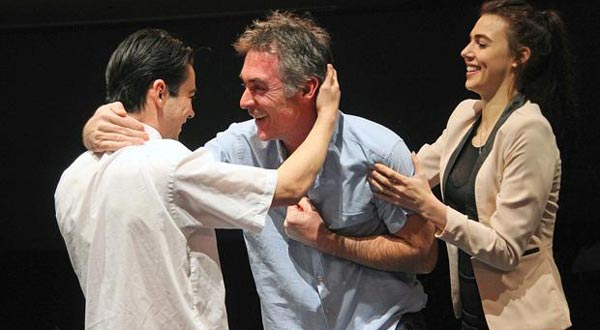
Kill Me Now
Park Street Theatre
27 February 2015
4 Stars
The father is tall, muscular, American. Able. The son is not short, gaunt, and his body is crippled. His hands, both of them, are gnarled and effectively useless for delicate work. His legs are twisted and won’t sustain his weight; he can’t walk. His face is contorted in awkward angles, his mouth a strange shape in his otherwise handsome face.
The father is bathing the son. Both feel awkward, but for different reasons. The son is awkward because puberty has come calling and he has no control over his penis; the father because the son is feeling awkward. He has been bathing his son almost all of his life, but suddenly it is awkward. The son complains of a sore butt. The father promises to apply soothing ointment, once the bathing is done. Dad cleans the genitals. Suddenly, a new presence. A boner.
Later, the father is recounting this moment of excruciating parental agony to his lover, a married woman who has an inattentive husband and two healthy sons. With alarming calm, she suggests that Dad offers his son relief. Perhaps unsurprising, Dad is taken aback. But she is resolute. The boy needs relief. If it was her son with the boner in similar circumstances, and if he was gay, she would give relief; if he was straight, she would get his father to do it. That way, no trace of ardour could be involved. The father’s eyes widen.
So do the eyes of every person in the audience.
This is Braham Murray’s production of Brad Fraser’s play, Kill Me Now, having its European premiere at the Park Theatre. It’s a domestic drama, as harrowing and intensely personal as they come. It deals with weighty themes ranging from questions of normalcy, adultery, parental responsibility, filial duty, the limits of domestic care for disabled persons, prostitution and euthanasia, but all the while it is grounded in the pain and joy of one extended family unit.
No doubt about it: it’s an eye-opener. It approaches difficult, taboo even, topics with unerring candour. As the inaptly named Sturdy family face up to the overwhelming vicissitudes of life, with as much grace, tension, sympathy and anger as can be expected for a small family, each blow seems horrific but inevitable, and a workable solution to joint woes more impossible to fashion. But the love and humour which lacerates and laces them together permits a solution which is both tender and devastating.
Fraser writes spare, realistic dialogue which gets to the kernel of character as well as situation. It’s brutal in parts, terrifically honest in others and genuinely funny throughout. Some of the sections drag slightly, and there might be one issue too many in the mix, but overall it is an impressive work which dares to tread unusual paths.
And the characters he creates are surprising and engaging.
Greg Wise, returning to the stage after a long absence, is impressive as the lone parent, doing his best to protect and care for his severely disabled son. He is at his best in the moments of deepest intimacy, of quiet pain. The scenes with his secret lover are full of restraint and sincerity and contrast superbly with the scenes of antagonism and spiky irritation (but real, abiding affection) with his corporate world sister.
But it is the scenes with his son Joey where Wise demonstrates his fine acting skills. From the opening scene, where the first bathing sequence occurs, Wise establishes his clear connection with Oliver Groom’s Joey. The sense of life long devotion is palpable. From that base, the pair create moments of aching, almost inconceivable rawness. The moment Joey furiously demands his father and Aunt discuss euthanasia is heart-stopping, largely because Wise has made the father utterly real, fallibly human.
Oliver Groom is a gifted and detailed performer as his turn here as the gnarled, physically helpless but mentally acute Joey amply demonstrates. He surrenders his whole body to the task, bravely and boldly; he unflinchingly creates a visceral physical characterisation and overlaps that with intelligent expressive eyes, which communicate constantly, and clever vocal gymnastics which, despite the limitations Joey’s speech impediment poses, convey colour, meaning and depth throughout. He is wickedly funny too.
Groom gives an intense, deeply felt, and completely realised portrait of disability. From joy to rage, his Joey is capable of anything and willing to do everything. He is utterly engaged at all times and wholly convincing – he is especially good at charting Joey’s passage from puberty ravaged adolescent to young man. Whatever you think you know about living with a disability, Groom’s performance here will enlighten you.
As Rowdy Akers, Joey’s mentally imperfect friend whose zest for life, fun and sex is unparalleled, Jack McMullen is a tornado of fresh, unaffected joy. He establishes an easy rapport with Groom’s Joey which is wholly convincing and he shows how the love and care he finds from Joey’s Dad and Aunt enriches his life and helps him face it. McMullen is winning and funny constantly, but he also carefully sketches Rowdy’s desperation for family. Another rich and careful performance of great skill.
Charlotte Harwood has a tough gig as Aunt Twyla, a woman who gives so much of her life and energy to Joey and her brother that there is little left for her own pleasures and pursuits. The sense of a life used up in work and family duty is potent in Harwood’s performance, but there is no trace of bitterness. Her forays into alcoholism and sexual adventure are nicely judged and she brings real balance to the dynamics of the Sturdy household where she is a constant visitor.
As the secret lover of Joey’s Dad, Anna Wilson-Jones brings practical and sensual warmth to the Sturdy men. Her scenes with Dad Jake are beautifully judged, the shame of adultery mixed with the pleasure of true connection and a joint, romantic need. Later, when she starts to build a relationship with Joey, Wilson-Jones is utterly beguiling: we see her through Joey’s eyes, knowing her through Jake’s. It is a gentle performance of great tenderness and compassion.
There is no doubt the play could descend into mawkish sentimentality but director Braham Murray ensures that integrity is the measure, not sentimentality. This is not to say that the production is not moving – it absolutely is. But it is also harrowing and contains two of the most confrontational scenes I have ever seen on the stage. The deft clarity Murray imbues each relationship and narrative pot-hole with ensures total engagement. The audience is constantly engaged, gripped and marvelling.
The Park Theatre is a wonderfully adaptable space and Juliet Shillingford’s design takes full advantage of that. Cleverly, the piece is set in the round (well, really a square) with the result that the audience is almost a part of the Sturdy men’s lives. The bare concrete walls suggest grime and a kind of prison, and the various pieces of furniture easily establish the various places where action plays out. Chris Davey’s lighting is meticulous, delicately suggesting mood and properly underscoring the actors’ work. Tayo Akinbode’s music, likewise, is effortlessly integrated, resonant and ideal.
This is a wonderful, sensitive production of an important play that boldly goes where few plays have gone before it. It’s essential focus on communication and the needs of humanity makes for difficult, confronting theatre. But ultimately, the warmth and spirit of the gifted performers ensures the experience is life-affirming and incredibly worthwhile.
